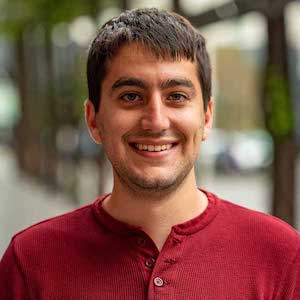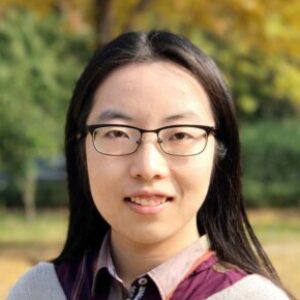Theory
Probabilistic Modeling
Optimization
High-Dimensional Statistics
Robustness
Causal Inference
Variational Inference
Bandits
Game Theory
Multi-Agent Learning
Sparsity
Cryptography
Faculty
-

Aloni Cohen
Assistant Professor of Computer Science and Data Science -

Nikos Ignatiadis
Assistant Professor of Statistics and Data Science -

Frederic Koehler
Assistant Professor of Statistics and Data Science -

Tian Li
Assistant Professor of Computer Science and Data Science -

Veronika Rockova
Professor of Econometrics and Statistics at the Booth School of Business -

Nathan Srebro
Professor, Toyota Technological Institute at Chicago; Professor, Department of Computer Science -

Victor Veitch
Assistant Professor of Statistics and Data Science -

Rebecca Willett
Faculty Director of AI, Data Science Institute; Professor, Statistics, Computer Science, and the College -

Haifeng Xu
Assistant Professor of Computer Science and Data Science
Aloni Cohen is an Assistant Professor of Computer Science and Data Science at the University of Chicago. Previously, Cohen was a Postdoctoral Associate at Boston University, with a joint appointment at the Hariri Institute for Computing and the School of Law. His research explores the interplay between theoretical cryptography, privacy, law, and policy. Aloni earned his PhD in electrical engineering and computer science at MIT where he was advised by Shafi Goldwasser and supported by a Facebook Fellowship and an NSF Graduate Student Fellowship. Aloni is a former affiliate at the Berkman Klein Center for Internet & Society and a Fellow at the Aspen Tech Policy Hub.
My research explores the interplay between theoretical cryptography, privacy, law, and policy. Specifically, I aim to understand and resolve the tensions between the theory of cryptography and the privacy and surveillance law that governs its eventual real-world context. Right now, I’m thinking about differential privacy, GDPR, the Fifth Amendment, encryption, multiparty computation, and the Census.
I am an assistant professor of Statistics and Data Science at the University of Chicago. Previously, I was a postdoctoral research scientist in the Department of Statistics at Columbia University. I received my Ph.D. in Stanford’s Statistics department in the summer of 2022, and my thesis was recognized with the Jerome H. Friedman dissertation award. Before that, I received degrees in Mathematics (B.Sc.), Molecular Biotechnology (B.Sc.), and Scientific Computing (M.Sc.) at the University of Heidelberg in Germany, where I was a researcher at the European Molecular Biology Laboratory.
As a statistician with formal training in mathematics, molecular biology, and computation, I seek to develop practical and theoretically justified statistical methods, accompanied by robust software implementations, for the analysis of datasets generated from modern technologies. My research is inspired by new modeling and inference opportunities made possible through the wealth of modern data. My methodological interests encompass empirical Bayes analysis, causal inference, multiple testing, and statistics in the presence of contextual side-information.
Frederic Koehler is an incoming Assistant Professor of Statistics and Data Science in January 2024.
Frederic is currently at Stanford University as a Motwani Postdoctoral Fellow. Prior, he was a research fellow in UC Berkeley’s Simons Institute in the Program on Computational Complexity of Statistical Inference. He received his PHD in Mathematics and Statistics from MIT, where he was coadvised by Ankur Moitra and Elchanan Mossel. Before that, he received his undergraduate degree in Mathematics at Princeton University.
His current research interests include computational learning theory and related topics: probability theory, high-dimensional statistics, optimization, related aspects of statistical physics, etc. In particular, he is very interested in learning and inference in graphical models.
Tian Li is an Assistant Professor of Computer Science and Data Science starting in July 2024. Her research interests are in distributed optimization, large-scale machine learning, federated learning, and data-intensive systems. Prior to CMU, she received her undergraduate degrees in Computer Science and Economics from Peking University. She was a research intern at Google Research in 2022. She received the Best Paper Award at ICLR Workshop on Security and Safety in Machine Learning Systems (2021), was selected as Rising Stars in Machine Learning (2021), and was invited to participate in EECS Rising Stars Workshop (2022).
Veronika Rockova is a Professor of Econometrics and Statistics and the James S. Kemper Faculty Scholar at the Booth School of Business at the University of Chicago. She joined Booth after completing her postdoctoral training in statistics at the Wharton School of the University of Pennsylvania. She teaches a course on Big Data at Booth. Her research interests lie at the intersection of statistics and machine learning, with a primary focus on creating innovative decision-centric tools for extracting insights from extensive datasets. She specializes in Bayesian computation, high-dimensional decision theory, and hierarchical modeling. Her applied areas of interest include healthcare analytics and computational medicine. Her research was acknowledged with the National Science Foundation CAREER Award in 2020 and the COPPS Emerging Leader Award in 2023. She currently serves as an associate editor for the Annals of Statistics, Journal of the American Statistical Association, and Journal of the Royal Statistical Society. Beyond her academic pursuits, Veronika is an avid pianist, tennis enthusiast, and golf neophyte.
Dr. Srebro is interested in statistical and computational aspects of machine learning, and the interaction between them. He has done theoretical work in statistical learning theory and in algorithms, devised novel learning models and optimization techniques, and has worked on applications in computational biology, text analysis and collaborative filtering. Before coming to TTIC, Dr. Srebro was a postdoctoral fellow at the University of Toronto and a visiting scientist at IBM Research.
I am an assistant professor of Statistics and Data Science at the University of Chicago and a research scientist at Google Cambridge. My recent work revolves around the intersection of machine learning and causal inference, as well as the design and evaluation of safe and credible AI systems. Other noteable areas of interests include network data, and the foundations of learning and statistical inference.
I was previously a Distinguished Postdoctoral Researcher in the department of statistics at Columbia University, where I worked with the groups of David Blei and Peter Orbanz. I completed my Ph.D. in statistics at the University of Toronto, where I was advised by Daniel Roy. In a previous life, I worked on quantum computing at the University of Waterloo. I won a number of awards, including the Pierre Robillard award for best statistics thesis in Canada.
Rebecca Willett is a Professor of Statistics and Computer Science at the University of Chicago. She completed her PhD in Electrical and Computer Engineering at Rice University in 2005 and was an Assistant then tenured Associate Professor of Electrical and Computer Engineering at Duke University from 2005 to 2013. She was an Associate Professor of Electrical and Computer Engineering, Harvey D. Spangler Faculty Scholar, and Fellow of the Wisconsin Institutes for Discovery at the University of Wisconsin-Madison from 2013 to 2018. Prof. Willett received the National Science Foundation CAREER Award in 2007, was a member of the DARPA Computer Science Study Group 2007-2011, and received an Air Force Office of Scientific Research Young Investigator Program award in 2010. Prof. Willett has also held visiting researcher positions at the Institute for Pure and Applied Mathematics at UCLA in 2004, the University of Wisconsin-Madison 2003-2005, the French National Institute for Research in Computer Science and Control (INRIA) in 2003, and the Applied Science Research and Development Laboratory at GE Medical Systems (now GE Healthcare) in 2002. Her research interests include network and imaging science with applications in medical imaging, wireless sensor networks, astronomy, and social networks. She is also an instructor for FEMMES (Females Excelling More in Math Engineering and Science; news article here) and a local exhibit leader for Sally Ride Festivals. She was a recipient of the National Science Foundation Graduate Research Fellowship, the Rice University Presidential Scholarship, the Society of Women Engineers Caterpillar Scholarship, and the Angier B. Duke Memorial Scholarship.
Haifeng Xu is an assistant professor in the Department of Computer Science and the Data Science Institute at UChicago. He directs the Strategic IntelliGence for Machine Agents (SIGMA) research lab which focuses on designing algorithms/systems that can effectively elicit, process and exploit information, particularly in strategic environments. Haifeng has published more than 55 publications at leading venues on computational economics, machine learning and theoretical computer science, such as EC, ICML, NeurIPS, STOC and SODA. His research has been recognized by multiple awards, including the Google Faculty Research Award, ACM SIGecom Dissertation Award (honorable mention), IFAAMAS Victor Lesser Distinguished Dissertation Award (runner-up), Google PhD fellowship, and multiple best paper awards.
The following research themes are the recent focus of our research lab. Please refer to our lab’s website for more details.
- The economics of data/information, including selling, acquiring, and exploiting information
- Machine learning in multi-agent setups under information asymmetry, incentive conflicts, and deception
- Resource allocation in adversarial domains, with applications to security and privacy protection